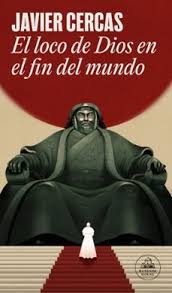
Original Language: Español
Year of publication: 2025
Valoración: Okay (therefore, disappointing)
I have not read the other works of Javier Cercas. I approached this book not so much for the author, whom I wanted to read a while ago, but for the subject itself: the journey of a writer to which the Vatican opens the doors to make a chronicle of a papal trip, specifically the trip to Mongolia of Pope Francis in 2023.
It could be said that I am closer to Javier Cercas in terms of his anticlerical and firm posture in his atheism, it could even be said that I find it difficult not to get out of rational typecasting when analyzing the various questions and answers he puts in the mouth of priests and other positions belonging to the Vatican hierarchy. And with everything, it is difficult for me not to think that this book would have been a deeper and more interesting novel in the hands of another writer, and out of atheistic or religious convictions.
I explain: the book is divided into three parts, In search of Bergoglio, Bergoglio soldiers and Bergoglio’s secret. At the risk of revealing the key situations, I will go directly to detail what I think are the deficiencies of the works.
To begin with, there is excessive reiteration of its militant atheist status. Of course Cercas tries to establish the tone of the work, the point of view with which the unusual proposal, its initial reluctance and its subsequent acceptance based on the promise to its sick mother of Alzheimer’s (on the other hand, for the reader this issue goes to the background quickly quickly quickly closes, despite the fact that in the first part it closes almost each chapter with a style phrase: “To ask God’s madman about the resurrection of flesh and eternal life and tell my mother.”), But the insistence with which he does, his distrust that the reader does not intuit or understands the transcendence of the trip, ends up boring by giving everything chewed. Not even the first encounter with Francisco reveals a literary management of the situation, just a cold report.
Cercas has been a strange mixture between wanting to focus on the figure of the Pope and his historical and personal tour and the interference of his narrator as someone tormented by the divorce of his Catholic heritage, not to mention the excessive dialogues that crowned each chapter with various characters that are forgetting one after another and that simply serve to repeat the same defects
The book improves with the trip to Mongolia, giving freshness to some extent, because then incurred again in the same errors (schematization of dialogues and even carpet of characters that, by their characters, should be potential: the disbelief and admiration that we would all feel for the missionaries is opacked precisely by the disbelief and admiration of the narrator, which feels artificial and repetitive). The only part that justifies the book is when the narrator meets the Pope to consult about what afflicts him, because that is when he really exposes an accurate description of a historical character and not a superficial semblance. The question itself lacks importance; In fact, one can intuit what the Pope has answered, and the need to hide it until the end of the story reveals a lack of alarming tension in a text of these characteristics.
I cannot say that it is not a book that is read quickly, that the reader of the internal mechanisms of conclaves and synods and other paraphernals unfounded knowledge, but everything ends up being so bland, all the narrator’s reflections seem to be basic (even the revelation of having discerned the person who is Jorge Bergoglio and his position as Pope Francis The feeling when closing the book is the one I mentioned at the beginning: I wish another writer had had the order (and the raising of the novel I do not know if he speaks worse of fences or the Vatican) of making a chronicle and being able to speak with the Pope, who, or not his figure and the institution he represented, has been a key character in recent years.
Signed: Félix
More from Javier Cercas reviewed in Ulad: here
Source: https://unlibroaldia.blogspot.com/2025/05/colaboracion-el-loco-de-dios-en-el-fin.html


